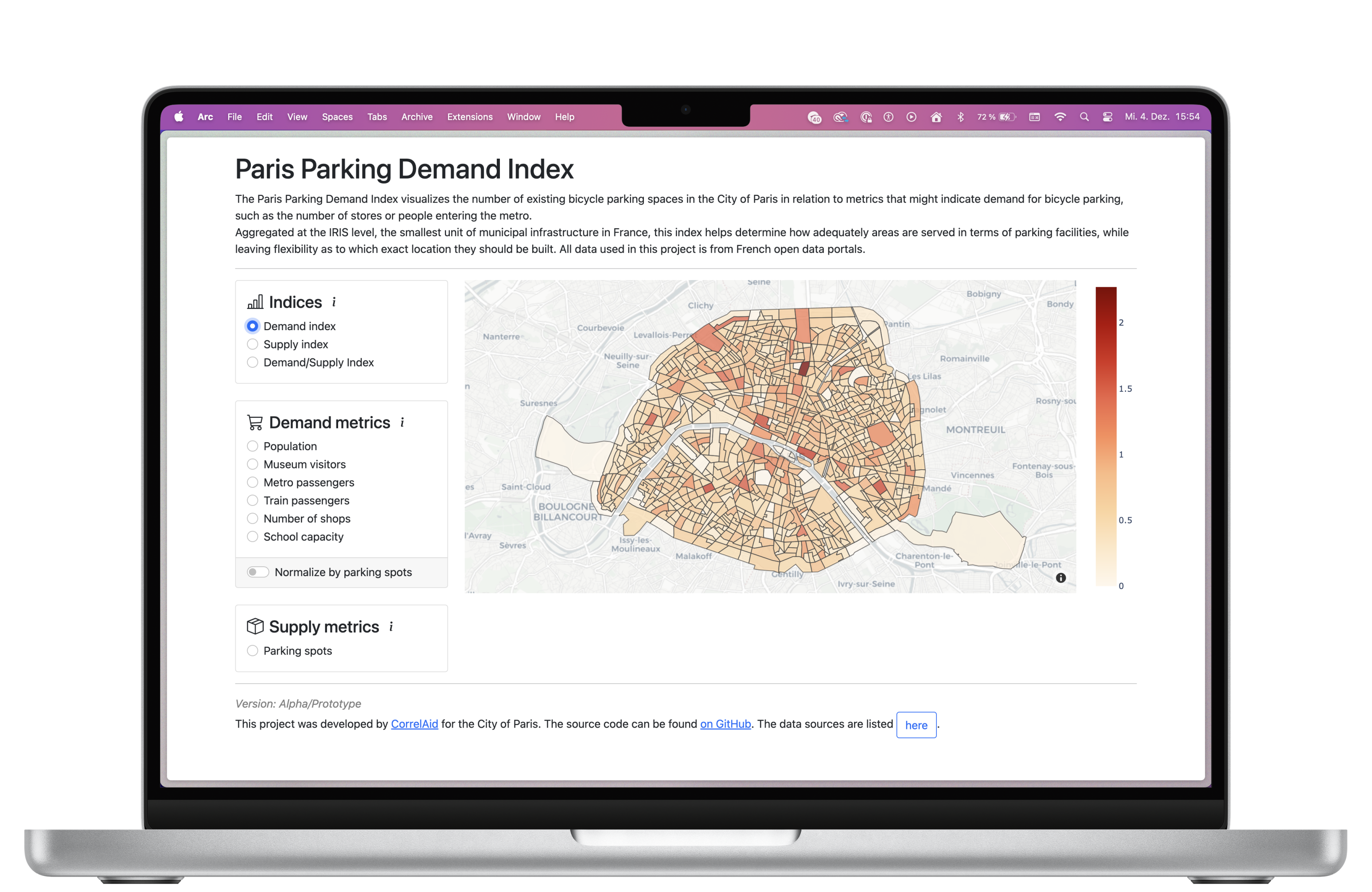Paris aims to become climate-neutral by 2050. The mayor of the French capital, Anne Hidalgo, has been working on measures to make Paris more climate- and people-friendly since 2014. Although these measures will improve the quality of life for the millions living in the city, the ‘Paris 2025’ project is repeatedly facing headwinds from the business community. And this is a good example of why the work of data scientists and CorrelAid is so important.
CorrelAid is a registered association that aims to democratise access to data in civil society. In Paris, for example, CorrelAid has created an interactive map of the availability of bicycle parking spaces. The data is freely accessible online and can therefore be used to further sustainable measures in Paris. In contrast, many initiatives from civil society are already failing at this very early stage.
Free data for greater equality
CorrelAid works with a decentralised network of data scientists who volunteer to assist with projects. Associations, initiatives and non-profit organisations in particular can make use of the scientists’ expertise. Through this, CorrelAid helps stakeholders who cannot afford to collect their own data. Or who have problems analysing data that has already been collected.
Nevena Nikolajević from CorrelAid believes that the “greatest leverage and responsibility for the climate transition lies not with individual consumers, but with politicians and large corporations.” This is precisely why “actors from civil society must try to influence political decision-makers or large corporations” through lobbying.
However, there is an imbalance here, particularly with regard to the availability of data. The financially-strong corporations and lobbyists have more power over the discourse. And so high-quality data and its evaluation would become a “decisive basis for being able to prevail against stronger players with ‘partially coloured’ facts”, says Nikolajević.
In short, those who can present the most convincing data will have a greater influence on decision-makers. And this is often the case regardless of whether this data has actually been reliably collected and analysed in a meaningful way.
Freely available data sets such as the parking data in Paris can help organisations and associations that represent interests such as climate protection or better living conditions. At the same time, many resources can only be utilised sensibly on the basis of reliable data.
How do organisations receive help from CorrelAid?
According to Nevena Nikolajević, initial contact with the CorrelAid team is usually made via a free data consultation. The consultation clarifies the most important questions about the data and how to interpret it. If there are still open issues, there is also the option of arranging a further session. If necessary, the relevant organisation or association can also be networked further in order to solve their own challenge.
In many cases, CorrelAid initially takes on an advisory role. However, some discussions also result in a new Data4Good project in which CorrelAid supports the organisation in tackling challenges together with their own team.
Are you a data-pro? This is how you can support CorrelAid
In addition to a permanent team of employees, CorrelAid works with volunteers. So if you are familiar with analysing data, you can support the association as a volunteer. According to Nevena Nikolajević from CorrelAid, the first prerequisite for volunteering is that you enjoy working with data. From there, you can explore various opportunities and areas that are looking for support.
Using open data correctly: StadtNavi Herrenberg
The city of Herrenberg’s StadtNavi project demonstrates the power of open data. As part of our special topic ‘Mobility Transition: The Multimodal and Interconnected Way of the Future’, we spoke to Jana Ziegler from StadtNavi Herrenberg.
StadtNavi is free navigation software that’s an alternative to Google, Apple and the like and is tailored to the needs of citizens and the requirements and offers of the region. The highlight: as StadtNavi combines freely available data in a meaningful way, it creates added value for both users and transport companies. At the same time, the developers protect users’ personal data.
Interested parties can get involved as volunteers in Data4Good projects, in which three to eight volunteers form a team and support non-profit organisations and initiatives in their work with data. Newcomers can also apply for trainee positions where they’ll be introduced to the work at hand.
Another option is to support CorrelAid in the coordination of projects. This does not involve working on the content of a project, but rather supporting the organisations in getting new projects off the ground.
There are also volunteer positions in the education sector. These include working as a mentor in the mentoring programme or founding or joining a local group. If you are interested, you can find contact details on the CorrelAid website.
What happened to the data from Paris?
Let’s come back to the example from Paris. Katharina Kloppenborg, project lead and long-time volunteer at CorrelAid, describes the data results as an “interesting visual and methodological approach”. Projects of this kind also encourage her and her team to “look at things from different angles”.
The example from Paris is actually a prime example of the benefits of freely available data. Even if they do not fulfil their actual objective, residents or local associations can benefit from them, as the information is freely available on the internet. Regardless of the organisation that collected the data, a citizens’ petition or initiative can use the data to drive forward the mobility transition in Paris. And that is an important contribution to equal opportunities, which would almost certainly not have happened without CorrelAid’s non-profit approach.
The post Against the Data Monopoly: How Correlaid Wants to Democratise the Availability of Data appeared first on Digital for Good | RESET.ORG.


